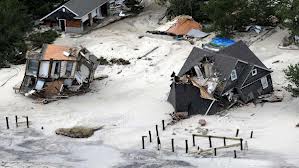
Below is a short but very instructive article that should be read by anyone who sustained damage in excess of the their insurance coverage.
Post-Sandy Flood Damage: Insurance Brokers May Be Liable
Law360, New York (December 03, 2012, 3:07 PM ET) — Many companies affected by Superstorm Sandy, including those in designated flood zones, have since discovered that they did not have flood insurance. In such situations, their insurance broker may have breached its duty to advise the companies of the availability of flood insurance and may therefore be liable for some or all of the flood damage. States offer many different and nuanced approaches regarding the duties of insurance brokers and policyholders, which can be illustrated by looking at case law from New Jersey and New York, two states severely affected by Superstorm Sandy. In New Jersey, an insurance broker is a fiduciary who owes a duty to the client to exercise good faith and reasonable skill. Aden v. Fortsh, 169 N.J. 64, 78–79 (N.J. 2001). An insurance broker is “expected to possess reasonable knowledge of the types of policies, their different terms, and the coverage available in the area in which his principal seeks to be protected.” Rider v. Lynch, 42 N.J. 465, 476 (N.J. 1964). This duty is enhanced because frequently, the insurance broker affirmatively promises the policyholder that it would review the company’s operations and advise it as to the insurance that it needs. Indeed, many insurance brokers now style themselves as risk consultants to emphasize that they have a broader role than merely procuring insurance. A risk management consultant must advise its client of “‘any additional coverages that the risk management consultant believed should be carried.” Warren Cnty. Vocational Technical Sch. v. Brown & Brown, No. a5937-05 (N.J. Super. Ct. App. Div. May 24, 2007) (citing to the trial court’s decision). Once its insurance policy is received from the broker, the policyholder has no obligation to read that policy — and the “failure to read the policy cannot be asserted as comparative negligence in an action against the broker for negligent failure to procure insurance.” Aden, 169 N.J. at 81–82. Rather, the company can rely fully on its broker. It is the broker’s “‘responsibility to put adequate coverage in place.’” Warren Cnty. Vocational Technical Sch. (citing to the trial court’s decision). New Jersey courts have found insurance brokers to be liable for their failure to procure adequate insurance coverage in a wide variety of circumstances. In Aden, the insurance broker procured the wrong amount of coverage. The policyholder, Benjamin Aden, engaged a broker to procure insurance coverage for his $48,000 condominium and its contents with an estimated value of $16,000. The policy issued to Aden, however, only provided $1,000 in coverage. When Aden’s condominium was damaged by fire, and the cost of repair far exceeded the small amount of coverage provided, Aden brought suit against the broker for negligently failing to procure adequate insurance coverage. The New Jersey Supreme Court held that the policyholder had no obligation to review the policy and found the broker liable.
y contrast, in New York, in order to prevail against a broker for its negligence in procuring coverage, the policyholder must show that it requested a specific type of coverage, that coverage was available and that the broker failed to obtain the requested coverage. Hoffend & Sons Inc. v. Rose & Kiernan Inc., 7 N.Y.3d 152 (N.Y. 2006). The policyholder could also demonstrate that it had a special relationship with the broker, which obligated the broker to obtain sufficient insurance coverage absent a specific request. Murphy v. Kuhn, 90 N.Y.2d 266, 272 (N.Y. 1997) (“Exceptional and particularized situations may arise in which insurance agents through their conduct or by express or implied contract with customers and clients, may assume or acquire duties in addition to those fixed at common law.”) On the duty of the policyholder to read the policy, a recent case from the New York Court of Appeals resolved appellate court disagreement on the issue when it held that “failure to read the policy, at most, may give rise to a defense of comparative negligence but should not bar, altogether, an action against a broker.” American Bldg. Supply Corp. v. Petrocelli Grp. Inc., No. 188 (N.Y. Nov. 19, 2012) (citing Baseball Office of the Comm’r v. Marsh & McLennan Inc., 295 A.D.2d 73, 82 (N.Y. App. Div. 2002)). The court added, “While it is certainly the better practice for an insured to read its policy, an insured should have a right to ‘look to the expertise of its broker with respect to insurance matters.’” Id. (quoting Baseball, 295 A.D.2d at 82). Given the variance in approaches by the states regarding the duties of insurance brokers and policyholders, a policyholder is well served in first determining the rules and requirements in the relevant state, including choice of law. Brokers often service clients in states other than those in which the broker is located. And of course, the broker is not always at fault. Superstorm Sandy was unprecedented. Prior to Sandy, many companies decided not to buy flood insurance — in part because flood insurance can be very limited in scope and with low policy limits, making it unattractive. New Jersey law, for example, could require that a policyholder demonstrate not only that the broker failed to advise it of the availability of flood insurance but also that the policyholder would have purchased the insurance if it knew it was available. Nevertheless, policyholders who experienced flood loss as a result of Superstorm Sandy should investigate whether they have a claim against their brokers for failing to advise or procure flood or other requested insurance. –By Robert D. Chesler and Matthew F. Putorti, Anderson Kill & Olick PC Robert Chesler is a shareholder in Anderson Kill’s Newark, N.J. office, and Matthew Putorti is an attorney in the New York office.




